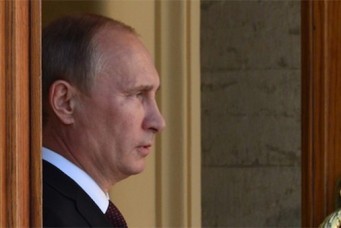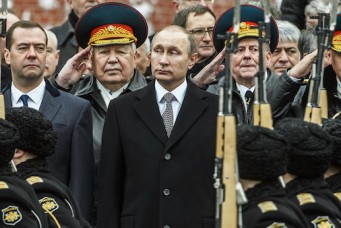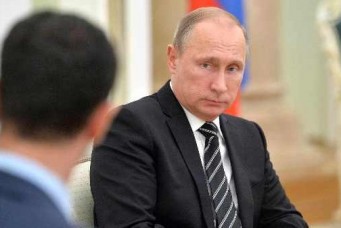Behind Putin’s Iron Curtain
Russia needs the West—but the realpolitik driving its foreign policy demands it be treated as an equal.

Russian President Vladimir Putin at the Kremlin in Moscow, Oct. 1, 2015. Yuri Kochetkov/Reuters
In February 2008, British journalist Edward Lucas published a book titled The New Cold War: Putin’s Russia and the Threat to the West. Back then many Russia-watchers found Lucas’ view overly alarmist. In retrospect, the book is prophetic. The 2003 U.S. invasion of Iraq changed President Vladimir Putin’s stance toward the United States—Putin blamed American unilateralism and “regime change” for unleashing chaos and disorder in world affairs. Even more important, Russia was pushing back against the color revolutions in the former Soviet Union republics. The Kremlin linked the popular upheavals between 2003 and 2005 in Ukraine, Georgia, and Kyrgyzstan—in which protesters adopted the color orange, the rose, and the tulip, respectively, to symbolize their resistance—to Western meddling.
A number of influential European Union (EU) countries, including Germany, France, and Italy, considered Russia a partner rather than a threat through the early 2000s. Russia’s oil and gas exports to the EU and large-scale influx of European investment and consumer goods to cater to the growingly prosperous Russian middle class had created unprecedented levels of economic interdependence in the 1990s, which accelerated after Putin’s arrival in the Kremlin in 2000. Even the brief conflict in Georgia in August 2008 did not lead to a rupture in relations with the West. Russia and the EU quickly returned to business as usual, agreeing to disagree on issues such as Georgia’s breakaway regions of Abkhazia and South Ossetia, which Moscow recognized as independent states. The Barack Obama administration followed down the same path. In 2009, the U.S. announced a reset of bilateral ties with Russia, manifest in cooperation on issues like nuclear disarmament and the sanctions imposed on Iran.
Fast forward to 2017 and Russia’s relationship with the West looks much closer to how Edward Lucas depicted it. Due to the March 2014 annexation of Crimea, Moscow is subject to economic sanctions by the United States and the EU. NATO revived its strategy of containment, deploying multinational troops in the Baltic states and Poland to reassure allies and deter Russia. Germany and France joined the camp of Russia-skeptics, shifting the internal balance from doves to hawks within the EU and ensuring there is a degree of unity within the 28-member bloc rarely seen before. The hope that there will be a shift in U.S.-Russian relations with President Donald Trump has gone unfulfilled. The scandal about Russian interference in the American presidential election and the difficulty of forging a common policy on Syria make the rapprochement elusive. In short, confrontation is here to stay.
What does Russia want? Putin’s overarching goal is preserving stability at home. He presides over a regime haunted by the memory of Soviet collapse and aware of the plentiful internal challenges facing “the system,” from ethnic tensions in the North Caucasus to social discontent driven by declining living standards. The period of steady growth and rising prosperity fuelled by record-high oil prices in the 2000s came to a halt with the global economic crisis. Nowadays, the Kremlin seeks legitimacy through foreign policy. The annexation of Crimea brought Putin’s popularity to sky-high levels, even though ordinary Russians continue to distrust state institutions and figures associated with the regime, notably Prime Minister Dmitri Medvedev.
Russia also wants to re-establish control over the former Soviet Union. The goal is, again, security in the Russian Federation itself, inasmuch as the Kremlin believes events next door have direct repercussions at home. That explains the harsh reaction against Ukraine’s choice to sign an association agreement with the EU and the ensuing Maidan Revolution in 2014, which toppled President Viktor Yanukovych and precipitated the annexation of Crimea and the war in Eastern Ukraine. This does not necessarily mean further annexation of territories populated by ethnic Russians or Russian speakers. Rather, it implies support for regimes that lean toward Moscow, rather than toward Washington or Brussels. To achieve this goal, Russia deploys a variety of instruments, from the encouragement of market integration via the Eurasian Economic Union (EEU) to the use of brute military force as in Ukraine and Georgia. The results are mixed: even Moscow’s closest allies such as Belarus and Kazakhstan have been hedging their bets and maintaining ties with rival poles of power such as the EU and, especially in Central Asia, China.
Finally, Russia wants to be a global, rather than simply regional power, and therefore able to transact on an equal footing with the United States. Though it is not nearly as powerful as the former Soviet Union, Putin’s Russia has certain assets: a nuclear arsenal, a permanent seat at the United Nations Security Council, hydrocarbons, its position as the world’s second largest arms exporter. The ongoing intervention in Syria has demonstrated Moscow’s ambitions backed by improved conventional military capacity. It has brought the Russians tremendous geopolitical dividends and made them a powerbroker in the Middle East, for the first time since the 1970s.
However, Russia knows it is too weak to restore the bipolar order of the Cold War-era, embracing instead the vision of multipolarity where it is part of the top tier of states along with the U.S., China, India, and other emerging powers. Whether this goal is within reach or not depends not so much on Russia’s foreign policy but on whether it manages to modernize and transform its economy and society. This remains an elusive aspiration. And that is why Russia still needs the West—despite the current dead-end in relations or indeed the rhetoric of Moscow’s own “pivot to Asia.” In the short term, Western powers may curry favor with Russia to fight the so-called Islamic State in Syria and Iraq (ISIS), or secure stability in the Caucasus and Central Asia. Yet Russia’s internal weakness, and the corresponding need for its integration into the European economy, coupled with China’s inexorable rise, will keep better relations with the West high on the Kremlin’s agenda.
Dimitar Bechev is a research fellow at the Center for Slavic, Eurasian and East European Studies, University of North Carolina, Chapel Hill, and a non-resident senior fellow at the Atlantic Council.




